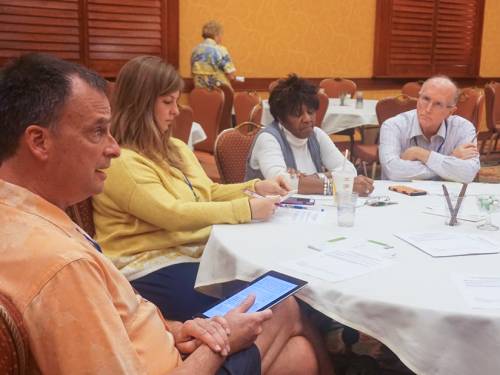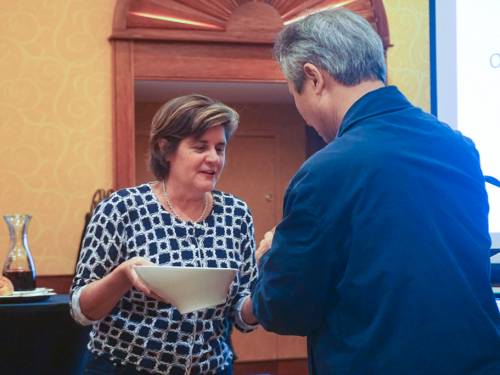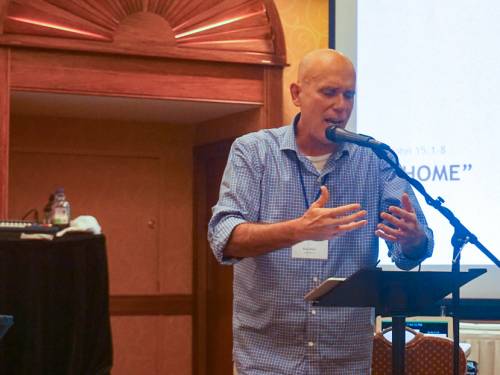Eddings and Jones deliver powerful closing messages to annual Disciple-Making Church Conference
March 19, 2017
There’s always that first time—that time in ministry when a pastor’s expectations go unmet.
It happened inevitably to the Rev. Jeff Eddings, who in 2004 co-founded the Hot Metal Bridge Faith Community together with a United Methodist colleague, the Rev. Jim Walker, in the South Side neighborhood of Pittsburgh.
“When you get into a ministry, you can’t help but have certain expectations of that ministry,” said Eddings to the gathering of pastors, church planters and leaders here for the annual Disciple-Making Church Conference. “We feel a sense of call, a desire to make a difference in the church and the world, to make disciples for Jesus. What happens when that is not always the case? What happens when our expectations are not met?”
Enter the Ignatian principle of Spiritual Indifference, which Eddings defined as “a relationship with God that allows us to hold loosely to our expectations and desired outcomes.”
The practices and disciplines of Ignatius, who went on to found the Jesuit order, are at the heart of the 2017 conference, titled Abide in Me… A Spiritual Purging, based on John 15:4. Eddings, the conference’s keynote speaker, holds that the spiritual exercises developed by Ignatius can help modern-day disciples live fuller mental and spiritual lives in order to bear more fruit for Jesus Christ and Christ’s church.A consummate storyteller, Eddings offered two powerful stories on the morning of January 19 to illustrate the third Ignatian principle, Spiritual Indifference, which he said “might be my favorite one.” On the conference’s two previous days, he presented the Ignatian concepts of Interior Freedom and Disordered Attachments.
With the story of Jason—a young man who after first connecting with the faith community subsequently cycled in and out of belief, addiction and jail—Eddings said he learned what it meant to fail at disciple making.
“I was supposed to be saving the world,” Eddings nearly shouted, “but here’s the good news—transformation was happening, but I was the one who was being transformed. God was using this adversity, all these failures, to prune me. To purge me of my disordered attachments [the first Ignatian principle], my need to be a people pleaser. It wasn’t all about me or how many disciples my church could process. Ultimately it was not about success, but about faithfulness.”
Eddings explained that indifference in the Ignatian sense does not mean giving up or not caring for community or self, but is rather “an indifference that understands that we are not in control, that surrenders itself to God.”
“God might do something totally different [from our expectations], and we’re going to have to be okay with that,” he said.
Through the story of Mike—whose lifelong struggle with mental health issues caused him, like Jason, to cycle in and out of Eddings’ s life and ministry—Eddings said he learned another important truth.
Mike, after having been absent from the faith community for some time and off many of his prescribed medications, unexpectedly called and asked to see Eddings, who wondered what he could possibly offer this man. Eddings subsequently concluded that all he could give was “just presence, that’s it, that’s all I have.”
“I was there to be a presence for Mike, but Mike was a presence for me,” said Eddings of their strange encounter, “and sometimes all we have is presence for each other, and that’s all we need. That is enough.”
Eddings’ s insights about “presence,” coupled with his observation that the arc of the gospel is a downward one following Jesus— “it’s not about success, but faithfulness”—prompted the Rev. Ray Jones, the evening’s preacher, to completely rewrite the closing sermon he had prepared.
Preaching on John 15:1-8, the scriptural basis of the 2017 conference, Jones, the associate director of Evangelism for the Presbyterian Mission Agency, said that as often as he had studied this Scripture, it wasn’t until working on his sermon called “Home” that he saw “something different.” Previously he said he had never taken into consideration that this passage was part of Jesus’ Farewell Discourse.
“It hit me this time that he’s at the Last Supper with his closest friends, and he’s teaching,” Jones said. “’You remember right now that your connection to me is going to give you all the life you will ever need. Furthermore, it is a full life and there’s nothing that can touch it. All your meaning is in this connection. It’s going to go on forever.’”
As he then reflected on his difficult upbringing, Jones said that as flawed as his parents’ efforts were, he eventually came to the conclusion that they did the best they could with the resources that they had. In coming to that realization, Jones said he “started thinking that what Jesus might be talking about with this connection, branches and a vine, is about being ‘home’ in the best sense of the word.”
Jones then moved into a deeper word study of the Greek word meno, translated as “abide” in John 15:4, where Jesus says, “Abide in me as I abide in you.”
“As I unpacked it, I understood [the word] as meaning a restful union with God, branch, vine,” said Jones. “In the depiction of the Last Supper, the beloved disciple was leaning up against Jesus, his head resting on Jesus’ shoulder…in other translations, on Jesus’ breast. He reclined into Jesus. Meno is the same root—lean into me. I don’t know about you, but I haven’t put my head on many people’s chests. Do you see what I’m talking about with this connection? That’s an intimate relationship, that’s what Jesus is talking about.”
Continuing to reflect on the branch-vine connection, Jones confessed to a “withering” that keeps him from fully experiencing the flow of Jesus’ love.
“I have these weird little branches growing off of it and they’re sucking the life out of me—the life that’s supposed to be coming from Jesus is getting sucked up by this stupid stuff,” he said. “I’m committed to Jesus, but I’m still on this journey of ‘Jesus and I gotta please people.’ That’s life-draining. That needs to be pruned. That needs to go away. I started out in ministry and I said I need to climb the ladder and be successful. Then I heard Jeff [Eddings] say, ‘That’s not it, Ray, that’s not the gospel. You’re going down. You’re dying. That branch has to get pruned and drop off.’”
Jones said that since he has started to live into three spiritual disciplines—silence, nature and being present with family—he has begun to find the life-draining branches being pruned.
“What disciplines are working in your life that are allowing you to experience this connection to know that you’re home?” asked Jones. “What if the whole reason that Martin Luther King Jr. started this whole nonviolence stuff that has changed our lives is because he knew God loved him so much? That’s what changes the world, when we know that there’s a full life, that we’re branches connected to that vine that will never die. So let’s come home again.”
Emily Enders Odom, mission communications strategist, Presbyterian News Service
Today’s Focus: Disciple-Making Church Conference
Let us join in prayer for:
Young Adult Volunteers 2016-17
Ekama Eni, Scotland
Isabella Fagiani, Scotland
Olivia Marenco, Scotland
Rachel Smith, Scotland
PC(USA) Mission Co-workers
Shelvis Smith-Mather, South Sudan
Nancy Smith-Mather, South Sudan
PC(USA) Agencies’ Staff
Earline Williams, PMA
Jeanne Williams, PMA
Let us pray:
God, unite us as the body of Christ. Help us to encourage those who feel down and to rejoice with those who are glad. May we hear your good news spoken by those who feel marginalized. Open our eyes to see you in a new light. Amen.
Daily Readings
Morning Psalms 84; 150
First Reading Jeremiah 6:9-15
Second Reading 1 Corinthians 6:12-20
Gospel Reading Mark 5:1-20
Evening Psalms 42; 32
![]() You may freely reuse and distribute this article in its entirety for non-commercial purposes in any medium. Please include author attribution, photography credits, and a link to the original article. This work is licensed under a Creative Commons Attribution-NonCommercial-NoDeratives 4.0 International License.
You may freely reuse and distribute this article in its entirety for non-commercial purposes in any medium. Please include author attribution, photography credits, and a link to the original article. This work is licensed under a Creative Commons Attribution-NonCommercial-NoDeratives 4.0 International License.


